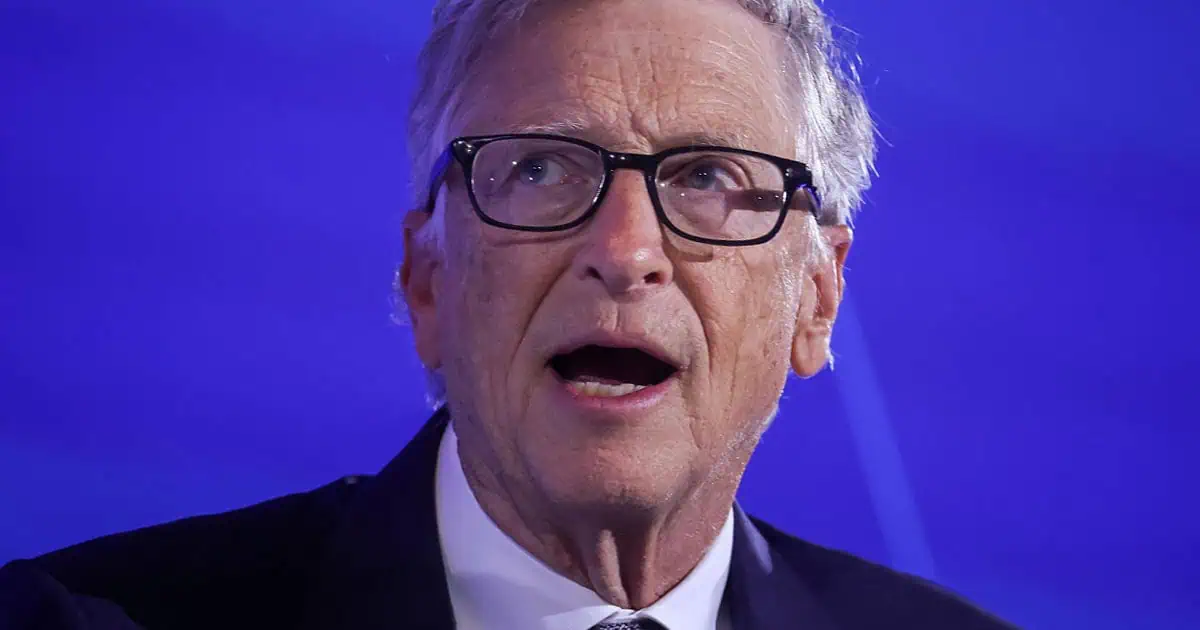Bill Gates’s vision of controlling the global food supply through synthetic “meat” is crumbling before his eyes.
Beyond Meat, once the darling of the plant-based protein industry and valued at nearly $8 billion, is now virtually worthless.
The fake meat industry has been exposed as a Wall Street bubble with no consumer appetite.
On Monday, the company’s stock plunged 50 percent after it unveiled a desperate plan to swap debt for new loans and flood the market with hundreds of millions of new shares.
The move bought Beyond Meat more time to pay its bills but came at the expense of investors, who were left holding an ever-shrinking stake.
The crash follows another steep 35 percent nosedive on September 28, when the CEO begged investors for more money.
Together, the twin selloffs have gutted the company’s value.
Once a market star, Beyond Meat is now worth just $79 million, barely a rounding error compared to its debt load of $800 million.
Analysts say the collapse isn’t just about Beyond, however.
The company’s failure is a reality check for the entire fake meat industry, long propped up by celebrities and globalist billionaires like Gates.
“Beyond Meat suffers from taste and texture issues, high prices, and perhaps an ‘ultra-processed food’ image,” said Jerry Thomas, CEO of Decision Analyst.
“The chances of the company surviving are meager.”
The Rise and Rapid Fall of Fake Meat
Beyond first hit grocery shelves in 2013, selling $10 packs of meatless patties branded with a cartoon cow in a cape.
By 2019, the company had become the face of the globalists’ “meatless future,” hailed as the climate-friendly replacement for cattle farming.
Its IPO stock price soared more than 350 percent, with fast food giants scrambling to test the craze.
McDonald’s added Beyond patties, Dunkin’ launched a breakfast sandwich, and Burger King hyped the “Impossible Whopper.”
But reality soon bit back.
Consumers rejected the products, citing taste, price, and distrust of their heavily processed nature.
It also emerged that the products were up to twenty-five times worse for the environment than real meat, putting off the industry’s target customers.
McDonald’s and Dunkin’ quietly dropped the options after sales collapsed.
Only Burger King still offers its plant-based Whopper.
Neil Saunders, managing director at GlobalData, said in a statement:
“The problem for Beyond Meat is that the company is not living up to its own hype.
“There is a market for fake meat, but consumers are broadly skeptical of the category as it is not seen as particularly natural and is viewed as being highly processed.”
WEF’s “Eat the Bugs” Agenda
The failure of Beyond Meat is also a blow to the World Economic Forum’s (WEF) so-called “Great Reset” agenda.
The WEF has openly promoted replacing traditional meat and dairy with synthetic proteins and even insects.
For years, the WEF has urged governments and corporations to steer consumers away from beef and pork and toward lab-grown “meat,” plant-based “substitutes,” and insect-based proteins, pitching these so-called “foods” as a “sustainable” solution to “climate change.”
WEF white papers have declared that by 2030, people will “own nothing and be happy,” a vision that includes global dietary control.
Bugs, synthetic proteins, and Gates’s patented fake “meat” products were supposed to replace ranching and traditional farming, industries the elites have smeared as “unsustainable.”
But just like the push for electric cars and wind farms, reality has undercut the utopian narrative.
Consumers have rejected insect burgers and cricket powders just as they are rejecting Beyond Meat.
Gates’s Farmland Monopoly
The fake meat collapse also intersects with Bill Gates’s land grab.
Gates is the largest private farmland owner in the United States, quietly buying up hundreds of thousands of acres.
Critics argue he is positioning himself to dictate the food supply, shifting farmers away from beef and crops toward his synthetic, globalist-controlled alternatives.
By controlling farmland and simultaneously investing in fake meat and lab-grown proteins, Gates hoped to engineer the market.
Instead, Beyond’s collapse shows that people are unwilling to abandon real beef, real dairy, and traditional farming for elite-engineered replacements.
Beyond Meat’s collapse is more than a business story: It’s proof that the globalist fake food agenda is falling apart.
Despite billions in hype, corporate endorsements, and media promotion, Americans still prefer real food over Gates’s ultra-processed experiments.
The company once pitched as the future of food has become a cautionary tale: when elites try to re-engineer human diets, consumers push back.
READ MORE – Bill Gates Moves to Replace Breast Feeding with Lab-Grown ‘Biomilq’

Our comment section is restricted to members of the Slay News community only.
To join, create a free account HERE.
If you are already a member, log in HERE.